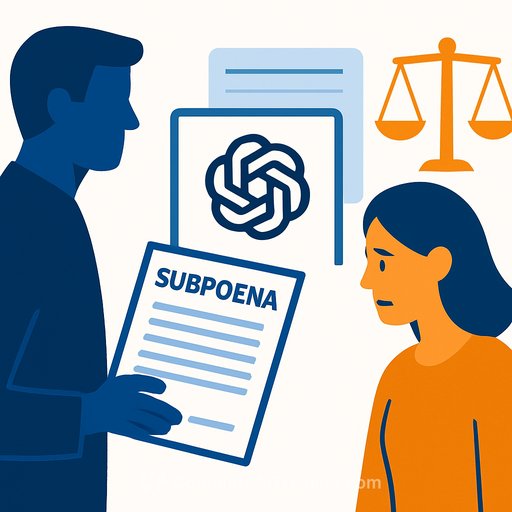OpenAI's Nonprofit Subpoenas: Practical Takeaways for Legal Teams
At least seven nonprofit organizations critical of OpenAI say they've been served with broad subpoenas tied to the company's litigation with Elon Musk. The requests seek donor lists, internal communications, and materials about governance and advocacy campaigns.
OpenAI's position: these are routine discovery steps to test for funding and coordination with opponents of its restructuring. Critics call the move intimidation and a speech-chilling tactic.
Who's been pulled in
Recipients include the San Francisco Foundation, Ekō, the Future of Life Institute, The Midas Project (Tyler Johnston), Legal Advocates for Safe Science and Technology (Tyler Whitmer), and Encode (GC Nathan Calvin). Several were not parties to the suit; one filed an amicus brief. One group also backed California's recent AI oversight bill.
Inside OpenAI, some leaders signaled discomfort. "This doesn't seem great," said the company's head of mission alignment. OpenAI's chief strategy officer countered that once third parties "insert themselves into active litigation," transparency on involvement and funding is fair game.
What the subpoenas ask for
- All information about funders and donations (identity, amounts, dates).
- All communications regarding Elon Musk, Meta, and Mark Zuckerberg.
- Documents on OpenAI's governance and organizational structure.
Nonprofits argue most requests are irrelevant to the Musk dispute and aim to expose internal strategy and supporters.
Why this matters legally
- Nonparty burdens and proportionality: Courts expect issuing counsel to avoid undue burden on nonparties and to tailor scope to claims and defenses. See the duty imposed under Rule 45 to minimize burden and expense (FRCP 45).
- First Amendment associational privilege: Advocacy groups can resist disclosure of member and donor identities where compelled disclosure would chill protected speech and association. Courts balance the requesting party's need against the risk of chilling effects, often requiring narrow tailoring and strong relevance. Foundational case: NAACP v. Alabama.
- Relevance vs. fishing expeditions: Requests seeking "all communications" or complete donor files are commonly trimmed unless the issuing party shows specific, non-speculative need.
- Protective orders and cost shifting: Courts may limit scope, require confidentiality, stage production, and shift costs where burdens are substantial.
- Public-interest advocacy: Where speech, petitioning, and policy work are central, courts scrutinize discovery that could deter future participation or policymaking efforts.
Playbook for counsel receiving a subpoena
- Preserve and triage: Implement a litigation hold; identify data sources and custodians immediately.
- Check service and forum: Confirm proper service, jurisdiction, venue for motions to quash, and return date.
- Calendar deadlines: Objections typically due in 14 days (or by compliance date). Don't miss them.
- Object with specificity: State relevance, overbreadth, undue burden, proportionality, and confidentiality grounds; reserve privileges.
- Assert First Amendment privilege: Show a credible chilling effect on donors/members; force a heightened showing of need and narrow tailoring before any disclosure.
- Segment categories: Propose targeted searches, time limits, and sampling. Offer categorical logs rather than item-by-item where appropriate.
- Seek a protective order: If disclosure is required, demand AEO/Confidential tiers, use restrictions, and clawback provisions.
- Cost containment: Document burden; request cost shifting for collection, review, and production.
- Minimize sensitive disclosures: Offer aggregated donor data or redacted lists; consider third-party neutral review for disputed categories.
- Coordinate comms and insurance: Align public statements with legal posture; alert carriers to potential claim or defense costs.
Guidance for issuing counsel
- Start narrow: Tie each request to specific claims/defenses; avoid "all communications" unless justified.
- Address privilege early: Offer a strong protective order and donor redaction protocols to reduce motion practice.
- Demonstrate good faith: Document meet-and-confer efforts and proposed compromises; courts notice.
- Be surgical with sensitive topics: If donor data is essential, justify with concrete evidence of coordination and consider de-identified or in camera review.
The governance and policy backdrop
OpenAI is pursuing a shift from a nonprofit-controlled structure to a for-profit public benefit entity, arguing it needs capital to achieve its mission. Critics say that move risks subordinating charitable assets and purpose to investor interests.
The dispute intersects with emerging AI regulation. One subpoenaed group supported California's new transparency rules for frontier AI developers, which OpenAI policy leadership had questioned before passage.
What to watch next
- Motions to quash, limit, or for protective orders, and how courts weigh donor privacy and advocacy chilling effects.
- Whether courts require concrete evidence of coordination before allowing sensitive discovery.
- Potential escalation to depositions of third parties if document productions prove thin.
- Internal governance fallout and public-policy responses as AI companies test aggressive litigation tactics against critics.
Key quotes (for context)
- "This behavior is highly unusual. It's 100% intended to intimidate," said a nonprofit advocacy leader.
- "This doesn't seem great," said OpenAI's head of mission alignment.
- OpenAI's strategy chief: subpoenas to third parties are a "routine step" to ensure transparency on involvement and funding.
Bottom line for legal teams: Treat these subpoenas as a stress test of nonparty discovery boundaries and First Amendment protections. If you represent advocacy nonprofits, prepare to build a clear record of chilling effects and burden, and force narrow tailoring under established standards.
Your membership also unlocks:






